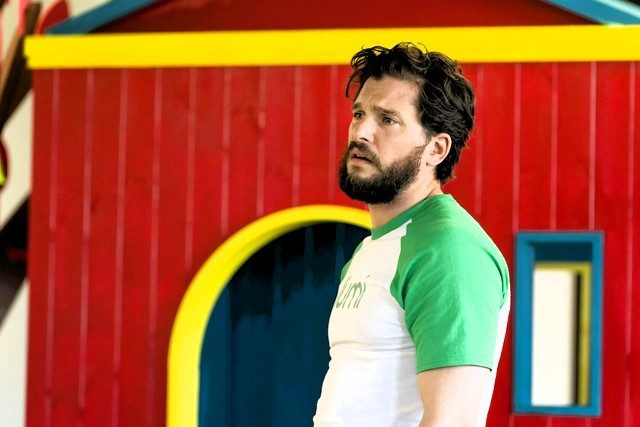LOS ANGELES, USA – “I’d seen the first two seasons and loved it and thought it was utterly unique,” Kit Harington declared about HBO’s Industry, considered one of television’s current best shows, which he joined in season three.
“I actually don’t like it being compared to other shows,” added the Game of Thrones star on the drama series, which makes the world of finance and investment banking sexy and irresistible. “I know we do it all the time, but being compared to like Succession and Euphoria, and all of that…”
Industry’s season three has a Rotten Tomatoes score of 96 percent among critics, with the consensus that it’s the best season yet. It’s not for everyone, but for those who relish crackling dialogue, high finance treated like an action thriller, complete with sex, drugs, and rock ‘n’ roll, this series may be your streaming high.
Speaking in a recent Zoom video conversation, the actor noted as Jon Snow and is now playing Sir Henry Muck in Industry, said, “The show is its own thing. I thought it was entirely unique as a show and that’s why I jumped at the chance to be in it when it came up.”
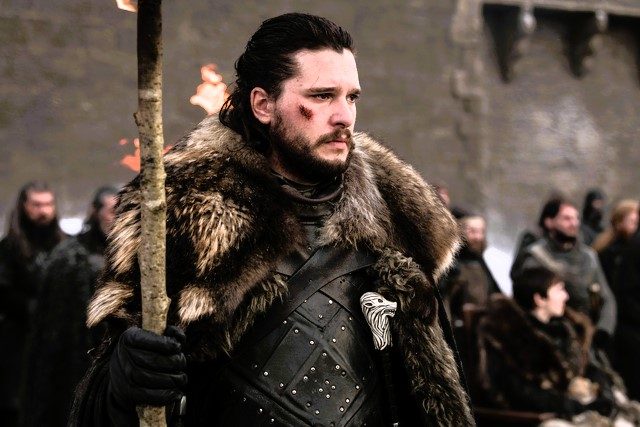
“I was just sitting here thinking that my challenge was to try and come in and not ruin it. Like not ruin a show I loved, not be the guy who comes in and it just doesn’t work.” The actor, married with two kids to Rose Leslie, his Game of Thrones co-star, need not have worried; as Sir Henry, he is earning his best critical notices since Jon Snow.
In the exciting, fast-paced series created by Mickey Down and Konrad Kay, about the power play and behind-the-trading drama at a top London investment banking firm, Pierpoint & Co, the terrific cast includes Myha’la (Harper), Marisa Abela (Yasmin), Harry Lawtey (Robert), Ken Leung (Eric), and Sagar Radia (Rishi).
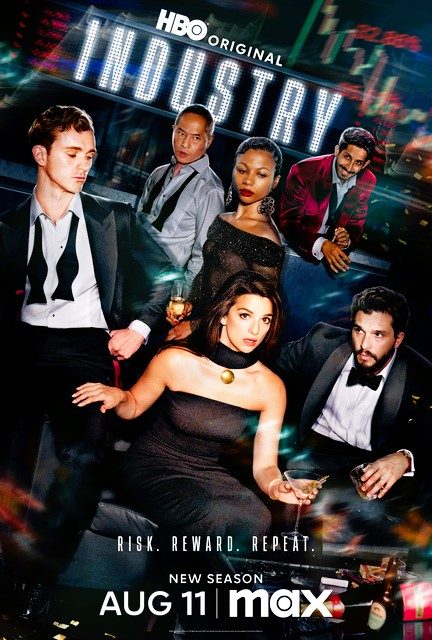
“I’d seen all of these guys,” Kit said of these actors who propelled the first two seasons. “I’d seen all of their performances and been blown away by all of them individually. So I knew I was going to be in very good company. It’s whether I could match that company and fit in the right way.”
For Kit, one of several scenes in the first two seasons that stood out and made him want to join the series was this: “I don’t know if a lot of people say this one to you, but who was it that ran into the glass wall? Greg (Ben Lloyd-Hughes). That just sums it up for me. It’s this brilliant, like brutal, horrific moment that’s kind of comedic and strange, and takes your knees out.”
“You’re like, what the hell is going on? I thought I knew what was going on with the show but that guy in the background has just run headfirst into a glass wall and is seriously injured. I think that is what’s brilliant about Industry for me.”
Into this world of university graduates jockeying for permanent positions and promotions in or out of Pierpoint, Kit steps in as a British blueblood who is the CEO of Lumi, a green energy (but of course, what else could be more au courant?) startup. It falls on the Pierpoint traders to spin a favorable story on Lumi as the latter launches its IPO.
Mickey and Konrad, the series co-creators, writers, directors, and executive producers, who were also in the video chat, talked about expanding Industry beyond Pierpoint’s desks cluttered with multiple computer monitors and conference rooms.
![[Only IN Hollywood] Kit Harington: From dragons to sexy high finance](https://financefundsupdate.com/wp-content/uploads/2024/08/1724568411_744_sddefault.jpg)
“Expanding the world was the mandate for the writers’ room at the very start,” Mickey began. “We obviously have a show about young people entering into a bank which is the genesis of the show. We called it Industry because we couldn’t think of another title.”
“But actually, it worked out well because it became quite a universal thing that we could discuss and explore. When we started the show, I’d say it had a narrow field of vision. It was very subjective to these grads.”
“We never had scenes where the grads weren’t in them. You never really saw the upper echelons of the bank. It was about what it’s like to sit next to someone for 20 hours a day sometimes.”
“How do you get your boss to like you, to respect you? How do you fuck up the salad order, all that stuff? It was very small, and then in season two, as the characters grew and we got a little more responsibility, we could raise the stakes a bit.”
“It felt like an organic place to raise the stakes, and in season three, we did the same thing again. The thing about Industry is, especially in season 1, we did not hold the audience’s hand at all.”
“By the time we got to season three, we really wanted to show how Pierpoint and banking fit into a wider industrial complex. We just wanted to write stuff that we found interesting, which is green energy.”
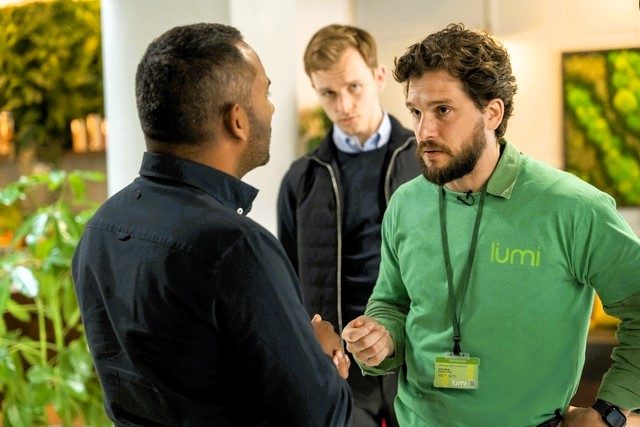
In this high-stakes London setting where terms like IPO, EBITDA, and ESG are bandied about like seductive enticements, it’s no surprise that both Mickey and Konrad worked in finance in real life.
“‘Worked’ is a very big word in this context,” dished Mickey, an Oxford graduate who left his banking job after a year to try his luck in film and television. “We were spat out by it. Weirdly but actually, I’m fascinated by the world of finance in a way that I really wasn’t when I actually worked in it.”
“I was always fascinated by the stuff that season one was fascinated by, which is weird gender dynamics, the way that people interact on the trading floor, the small minutiae of working somewhere like that. But now, I’m actually interested in macro questions about finance and capitalism.”
Konrad, who was fired from Morgan Stanley after three years, was asked by Mickey, his long-time friend, to try their luck in film and TV.
Konrad shared that Industry has made him more interested now in the field that pushed him out. “You actively watch Central Bank news now, like Mickey will tell me, ‘Now there’s a UK rate cut coming.’ I’m like, ‘Okay, great, what do you want me to do with that information?’ ”
Mickey added, “It’s also because obviously, we have amazing consultants on the show. But you have to read about this stuff to make it feel like it’s reflecting what’s happening in the real world. I wish I’d liked it a bit more when I was actually in it.”
“Season three is stronger because of that interest,” Konrad stressed. “With the whole ESG thing, it feels like the show has a far more coherent theme than the previous two seasons, which will make people enjoy it a little bit more because finance was so piecemeal in seasons one and two”
“It was kind of central but it was kind of nonsense because there were too many desks, too many trades. It was a real black box where in season three, we just streamlined everything and it makes it a bit more accessible, hopefully.”
Back to Kit, he was asked about his co-star Harry Lawtey with whom he has many scenes since the latter, who portrays Robert Spearing, is the Pierpoint rep assigned to Lumi as it is about to go public.
Kit quipped, “We have quite a bromance going quite quickly. I like taking photos of Harry. I do. I’ve got a lot of photos of Harry. He’s a very good-looking man. And well, I’m sorry, I’ve got lost in the thoughts of Harry now (laughs).”
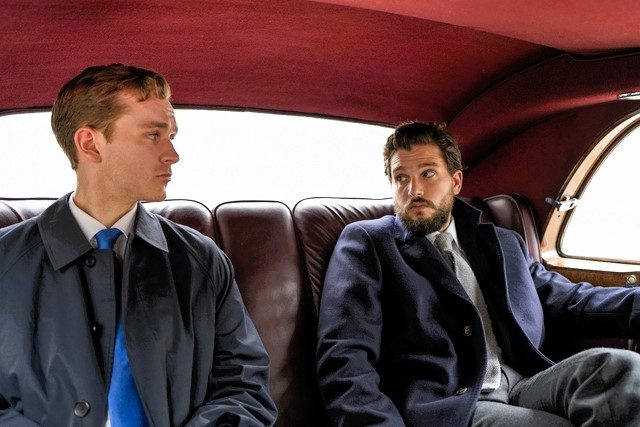
“I think their relationship is fascinating because of their backgrounds. And this season being so much, in so many ways, about the British class system, Harry and I spoke about this, how they sort of love and hate each other.” On the hate side, watch for the scene where Kit’s man-child Sir Henry and Robert tussle in Lumi’s…childcare playroom.
“I think that goes right back to their class. Robert, from a working-class background; Henry, being from a more aristocratic kind of upper-class background,” explained Kit, who comes from a noble family in real life (he is related to King James 1 on his baronet father’s side).
The London-born actor, whose full real name is Christopher (after Christopher Marlowe, the English dramatist) Catesby Harington, reportedly did not know his real name until he was 11.
“Traditionally in the UK, those two class systems tend to join forces, and like each other in their mutual hatred of the middle class. I thought that was useful for us going through that we kind of loved and hated each other in that way.”
The 37-year-old actor was asked for his take on Sir Henry in Industry, which coincidentally shares the same prestige HBO Sunday slot with Game of Thrones, Succession, The Sopranos, and The Wire. A side note: Sir Henry has a kinky yen for urine, yes, urine.
“I’ve known a lot of people like Henry,” said the actor who is also earning praise in Slave Play, a race drama now on West End. “I’ve just met a lot of them. What I found fascinating about him was that he can’t see his own privilege, amazingly. He might say he does but he can’t see it.”
“He’s kind of within this net of privilege that he can’t see out of and can’t see how he’s held. And yet, at the same time, within that little gilded cage, these horrific things have happened in his life.”
“And I thought that was a fascinating place to start with someone and explore someone in that place of privilege. Yet they’re deeply not happy and don’t know who they are. It’s that story, really.”
“I also found the idea of someone charming and yet threatening is a really fun one to play. And we had this joke going about how many times he uses the word ‘vulnerable’ in the show.”
“He’s that modern guy who’s gone to therapy and understands fully the world has changed, and that he, as a man, has to change with it. But will now manipulate women with therapy chat and doesn’t and can’t see it. I just thought, what a wonderful character to get on board with.”
Kit was quoted in another interview as saying that Sir Henry is “a modern entitled man.”
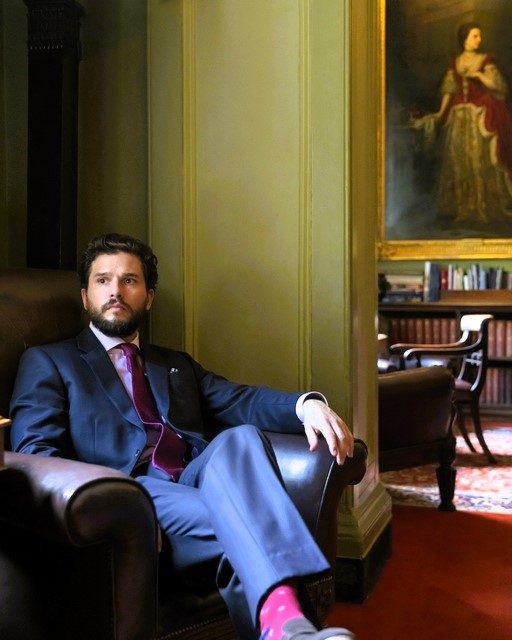
Kit’s character exemplifies how Industry has expanded from a drama centered on grads trying to make it in Pierpoint to a wider story including the big bosses as well.
Mickey said, “The way this show was unlocked for us when we started coming up with it, was that it was going to feel like the sort of people that you would never have expected to be in this situation because as much as I love stuff set in this world, it’s usually from the top down lens.”
“And it’s mostly rich white people who are at the apex of their career rather than people who are slightly more marginalized within this. That was always what was exciting — it was always going to be an outsider story but then it’s organic.”
“It’s not like, let’s just get every single different race and put it into the show and it will feel like an unexpected way in. But in these places, even though they have this really rigid system in the UK, there are lots of blue-blooded people in them.”
“There is a lot of diversity, especially in the American investment banks and on the trading floor. Diversity obviously works very well but clashes quite a lot as well.”
“And that was a very interesting way in for us. This is a really grandiose way of saying it but the show for us is a sort of picaresque story. It’s Vanity Fair. When we are feeling very grand about ourselves, we compare it to Barry Lyndon.”
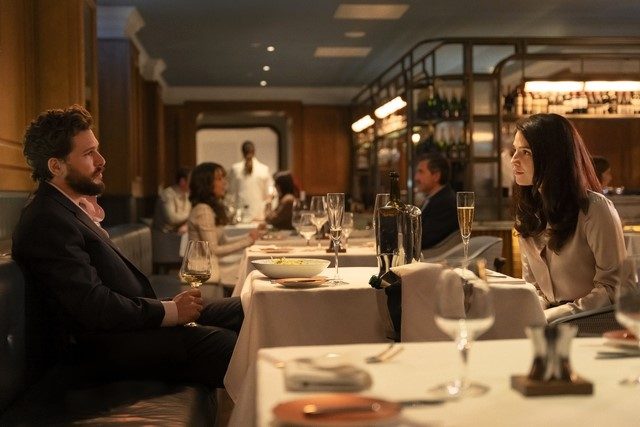
Following up on what he said earlier about how he frowns on Industry being compared to other shows, Kit was asked to comment on the show being like Game of Thrones only in the sense that its original cast is composed mostly of actors who got their first breaks in the show.
“I would say, like thematically, story-wise, and all of those things, I don’t think this show is comparable in any way,” Kit emphasized. “I don’t think it’s similar to Game of Thrones at all but as far as my experience within this show as an actor goes, it’s actually very similar.”
“I say that because there’s a lot of actors in this, brilliantly talented young actors, who had this as their first job. That was my experience on Game of Thrones. I came in, and I think that does bring a level of excitement.”
“I genuinely believe in a successful TV show such as this or Game of Thrones, a lot of the work is done off set, actually. It’s in the relationships that are built up off set. It’s in how people kind of get on. It’s a family unit.”
“And if that’s working, then the show can go and work and that’s led from the top down by the boys (creators) here. But it’s also in the excitement brought to the show by a group of people coming in, for some of whom this is their first job.”
“And that kind of fizzes so with that, alongside it being on HBO, which does that so well and nurtures that culture so well, I think there’s a lot of similarities to that little previous show I was on.” – Rappler.com

